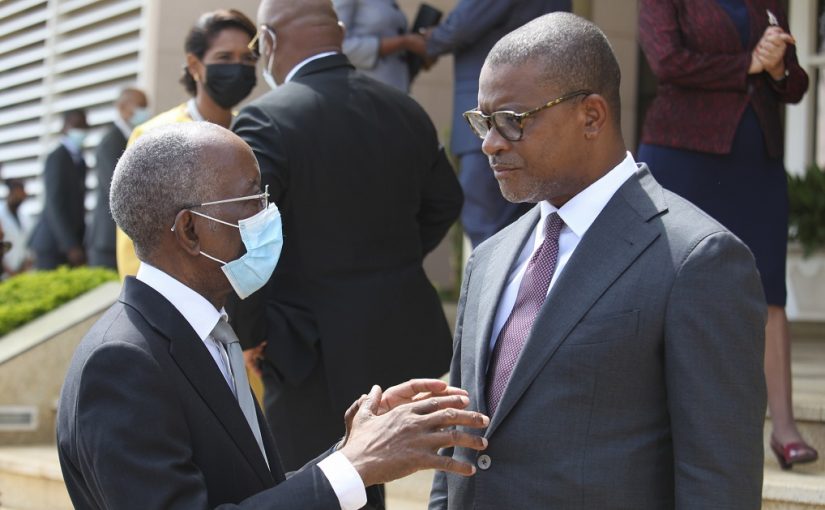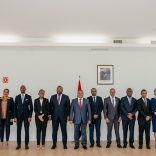Mozambique: Tractors for passenger transport only where roads cannot be built - Watch
Mozambique: Government reshuffle pauses negotiations with the IMF

FILE PHOT - For illustration purposes only. Newly sworn in Prime Minister Adriano Maleiane (left)speaking with newly sworn in Economy and Finance Minister Max Tonela, in Maputo on March 4 2022. [File photo: Lusa]
Negotiations between the International Monetary Fund (IMF) and the Mozambican government, advised by the Bank of Mozambique, regulator of the national financial system, have been interrupted by personnel changes at the Ministry of Economy and Finance.
On March 3, the President of the Republic appointed Adriano Maleiane prime minister, appointing to the resulting vacant post of Minister of Economy and Finance, Max Tonela, former Minister of Resources, Minerals and Energy.
In order to create space for new Minister of Economy and Finance Maleiane to become familiar in depth with the negotiations aimed at Mozambique regaining IMF support, the parties decided to temporarily suspend the dialogue, the IMF revealed to ‘O País Económico’.
“Negotiations continue. We took a technical break, to allow for a smooth transition between the new ministerial appointments,” IMF Resident Representative in Mozambique, Alexis Meyer-Cirkel, explained.
Despite the pause and the change in the minister responsible, the pillars of the negotiations between the parties remain intact, Meyer-Cirkel said. It is only a matter of time, which may indeed be short, before the IMF resumes funding to the State Budget, suspended about six years ago in 2016 following the discovery of undisclosed debts of around US$2 billion guaranteed by the Mozambican state.
“The program framework that we are discussing remains the same, regardless of the person in charge of the ministry,” the International Monetary Fund says.
According to the IMF, there are still a number of important steps to be taken to reach the final objective.
The international financial institution says that, when an agreement between the Fund and the Mozambican government is reached, an extensive document explaining their joint view of the situation and making a macro-economic-fiscal projection will be sent for approval by the Executive Council of the IMF, in which Mozambique is also represented.
“The Executive Board then decides on approval, and immediately afterwards, the first tranche of funding is made available,” the IMF representative clarified.
Regarding the deadlines previously foreseen for the conclusion of the negotiations (June of this year) the IMF says that it is still working on that understanding. “However, everything depends on reaching a common agreement,” it says.
Transparency in governance and complying with the Fund’s recommendations are among the conditions for the resumption of direct financing of the Mozambican State Budget, which this year has a deficit of 151,660.0 million meticais, equivalent to 13.5% of gross domestic product (GDP).
The suspension of general budget support by cooperation partners in 2016 cost the Mozambican state around 10.9 billion meticais that year, and, from 2016 to 2019, the government received no direct general budget support at all.
By 2020, the situation was a little different. To counter the impact of Covid-19, the government received direct budget support from the IMF and the World Bank in the amount of 21,038.3 million meticais (equivalent to 2.1% of GDP).
The government’s view is that Mozambique needs support because there is a context of problems to be solved that puts great pressure on the state budget, requiring it to find funding. Support for the IMF has the advantage of mobilising support from other sources, too.
In December 2021, at the end of a visit to Mozambique, the IMF team said decisive policy action was needed to keep the country’s debt on a sustainable path, reduce vulnerabilities and free up resources for priority spending.
“On current policies, primary fiscal balance (after grants) would be reached only in 2026, after LNG revenues become more significant. Additional budgetary resources could be raised through reforms in tax policy – notably VAT exemptions, with care to minimize the impact on the most vulnerable households – and revenue administration,” the IMF team said.
“To rebalance expenditures towards priority areas – security and humanitarian challenges, health, education, social and resilient infrastructure needs – savings on the public wage bill and continuing reforms in public financial management are needed,” they conclude.
By Clemencio Fijamo













Leave a Reply
Be the First to Comment!
You must be logged in to post a comment.
You must be logged in to post a comment.